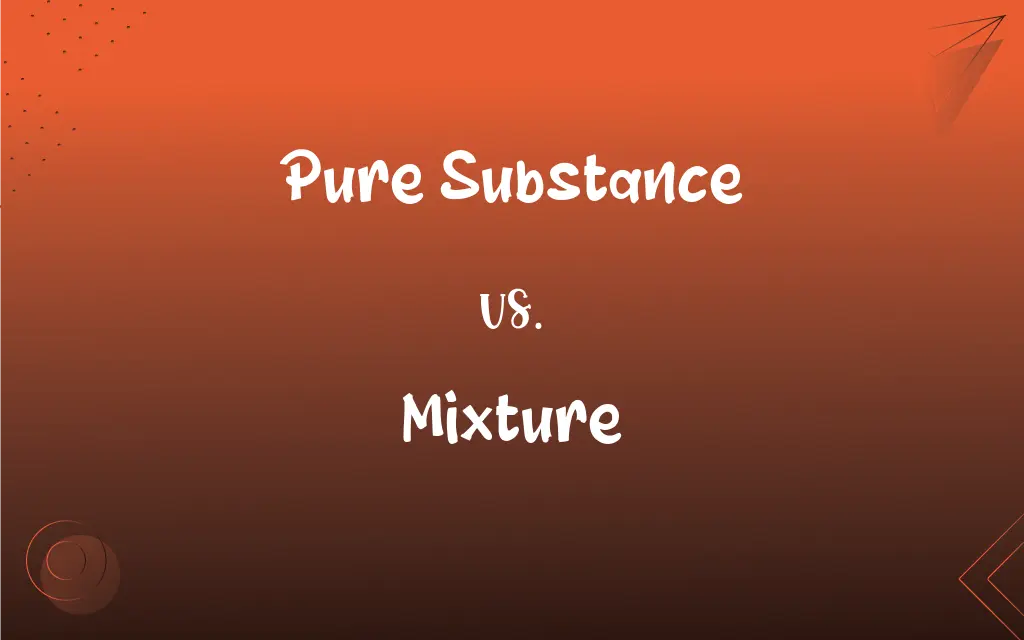Pure Substance vs. Mixture: What's the Difference?
Edited by Aimie Carlson || By Harlon Moss || Updated on October 4, 2023
A Pure Substance has a fixed composition with identical molecules, while a Mixture contains two or more substances combined without chemical bonding.

Key Differences
A Pure Substance represents matter that has a consistent composition and specific properties. Whether in the form of elements or compounds, a Pure Substance possesses identical molecules or atoms throughout. For instance, gold in its elemental form or water in its compound form represent Pure Substances. Their composition and characteristics remain unchanged irrespective of the sample size.
Contrarily, a Mixture comprises two or more different substances physically combined, not chemically bonded. As such, the components in a Mixture retain their individual properties. The proportions of these components can vary, leading to non-uniform compositions in different samples. Sand and salt combined illustrate a Mixture, where both retain their unique attributes.
Delving deeper into Pure Substances, one notes that they have fixed melting and boiling points. This uniformity stems from their unchanging composition. So, when a Pure Substance transitions between states (like solid to liquid), it does so at specific, constant temperatures.
Mixtures, given their varied components, exhibit varying melting and boiling points. This variability is due to the different substances present, each with its distinct transition temperatures. For instance, an oil-water Mixture will separate when heated, as each component has a different boiling point.
In essence, while a Pure Substance is homogeneous and consistent in its composition and properties, a Mixture is heterogeneous, with its constituents maintaining their distinct identities.
ADVERTISEMENT
Comparison Chart
Composition
Fixed and uniform.
Variable and can be non-uniform.
Type of Bonding
Chemical bonds within substance.
No new chemical bonds formed.
Variability
Cannot vary in composition.
Can vary in composition.
Melting/Boiling Point
Definite and constant.
Varies depending on components.
Separation
Requires chemical means.
Can often be separated by physical means.
ADVERTISEMENT
Pure Substance and Mixture Definitions
Pure Substance
Substance with unchanging physical and chemical properties.
The boiling point of water, a Pure Substance, remains consistent at 100°C.
Mixture
Combination of two or more substances without chemical bonding.
A salad is a Mixture of various vegetables.
Pure Substance
Material with a constant composition throughout.
Gold is a Pure Substance because it consists of only one type of atom.
Mixture
Composition that can be separated by physical processes.
A Mixture of oil and water can be separated by decantation.
Pure Substance
Matter that cannot be separated into different components by physical methods.
Helium, a noble gas, is a Pure Substance that can't be broken down by simple physical means.
Mixture
Substance with variable composition and properties.
A fruit punch is a Mixture with taste varying based on the fruits added.
Pure Substance
Matter composed of identical molecules or atoms.
Oxygen gas (O2) is a Pure Substance as it has only oxygen molecules.
Mixture
Blend of different substances without specific ratios.
Air is a Mixture of multiple gases like oxygen, nitrogen, and carbon dioxide.
Pure Substance
Single element or compound with a homogenous composition.
Carbon dioxide (CO2) is a Pure Substance made of carbon and oxygen.
Mixture
Material where individual components retain their properties.
In a sand and salt Mixture, both components maintain their distinct properties.
Mixture
The act or process of mixing
An alloy made from the mixture of two metals.
Mixture
The condition of being mixed
The inevitable mixture of different cultures in big cities.
Mixture
A combination of ingredients used in cooking or baking.
Mixture
One that consists of diverse elements
The day was a mixture of sun and clouds.
FAQs
Is distilled water a Pure Substance?
Yes, distilled water is a Pure Substance as it contains only water molecules.
Does a Pure Substance have a fixed boiling point?
Yes, a Pure Substance has a constant boiling point specific to it.
Can a compound be a Pure Substance?
Yes, compounds like water or carbon dioxide, with a fixed composition, are Pure Substances.
Can the components in a Mixture chemically react with each other?
Not inherently due to mixing. If they do react, the result will be a new substance, not a Mixture.
Are all elements considered Pure Substances?
Yes, elements, consisting of one type of atom, are Pure Substances.
Is milk a Pure Substance or a Mixture?
Milk is a Mixture as it contains water, fat, proteins, and other components.
What is an example of a gaseous Mixture?
Air is a gaseous Mixture containing oxygen, nitrogen, carbon dioxide, and other gases.
Is gold jewelry always a Pure Substance?
No, gold jewelry often contains alloys and is not always a Pure Substance.
What is a Pure Substance?
A Pure Substance has a fixed composition with identical molecules or atoms throughout.
How is a Mixture different from a Pure Substance?
A Mixture contains multiple substances combined without chemical bonding, while a Pure Substance is chemically consistent.
Can a Mixture be separated?
Yes, a Mixture can often be separated into its components using physical methods.
Can the composition of a Mixture vary?
Yes, the composition of a Mixture can vary based on the proportion of its components.
How can a sugar-water Mixture be separated?
A sugar-water Mixture can be separated by evaporation, leaving behind sugar crystals.
Is granite a Mixture or a Pure Substance?
Granite is a Mixture of minerals like quartz, feldspar, and mica.
Can a Pure Substance be broken down further?
A Pure Substance can be broken down only through chemical methods, not physical ones.
Is table salt a Pure Substance?
Yes, table salt (sodium chloride) is a Pure Substance when it's free from impurities.
Is copper a Pure Substance?
Yes, if it's pure copper with no impurities, it's a Pure Substance.
How is a homogeneous Mixture different from a Pure Substance?
While both appear uniform, a homogeneous Mixture has multiple substances combined without bonding, while a Pure Substance is chemically consistent.
Can a Mixture exhibit properties of its components?
Yes, a Mixture retains the properties of its individual components.
Are alloys like bronze Pure Substances?
No, alloys like bronze are Mixtures of metals, such as copper and tin for bronze.
About Author
Written by
Harlon MossHarlon is a seasoned quality moderator and accomplished content writer for Difference Wiki. An alumnus of the prestigious University of California, he earned his degree in Computer Science. Leveraging his academic background, Harlon brings a meticulous and informed perspective to his work, ensuring content accuracy and excellence.
Edited by
Aimie CarlsonAimie Carlson, holding a master's degree in English literature, is a fervent English language enthusiast. She lends her writing talents to Difference Wiki, a prominent website that specializes in comparisons, offering readers insightful analyses that both captivate and inform.
































































